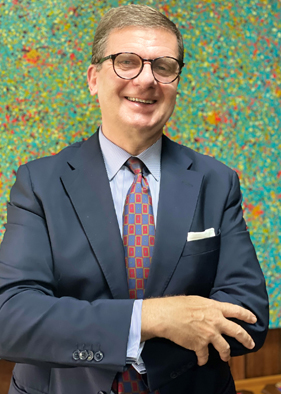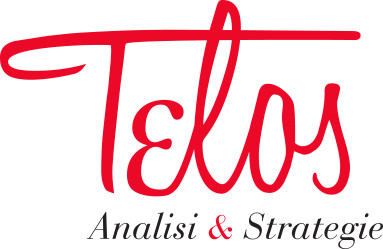April 2022, Year XIV, no. 4
Francesco Azzarello
Ambassador… Despite Covid
“I have been in Brazil for over two years and, despite the pandemic, I can say that no part of the embassy’s activities ever stopped during the health emergency. Quite the contrary, this long emergency has forced us to rethink our diplomacy in all fields by reassessing how we work in the office and meet outside the office”.
Telos: What does an Ambassador do? What does it mean to represent your Country? We often wonder about this. How much weight should Ambassadors give to their political, economic and cultural roles?
Francesco Azzarello: An Ambassador’s job is to represent their Country within another State, and I stress that I’m referring to the Country as a whole, not just the Government. This job is so vast and full of responsibility that the easier question might be: what does an Ambassador not do. My job is political, economic and cultural, not to mention my consular activities, which in a country like Brazil means offering services to almost 700,000 fellow citizens registered with the AIRE (Register of Italians Residing Abroad), 692,234 Italians to be exact according to the latest report, including over 32,000,000 Italian Oriundi who have the right to obtain citizenship and each year help boost the number of fellow citizens who are residents here.
I have been in Brazil for over two years and, despite the pandemic, I can say that no part of the embassy’s activities ever stopped during the health emergency. Quite the contrary, this long emergency has forced us to rethink our diplomacy in all fields by reassessing how we work in the office and meet outside the office.
In many ways it has been tough, but I think we have managed to successfully cope with this crisis. None of what drives our diplomacy in Brazil ever stopped, and we actually opened up new frontiers of cooperation in the field of healthcare and scientific research.
From Brazil’s participation in the Italy-led G20 in 2021 and the closing meeting in Rome in October to the organisation of cultural and business promotion events, first virtually, then with limited participation, I know that the Embassy in Brasilia has always been up to its delicate mission: to best represent Italy in Brazil.
Brazil and Italy are united by strong ties rooted in the distant past. Is there still unfulfilled cooperation potential?
The roots of our bilateral ties are deep, very deep, and are peremptorily reflected in the number of people here of Italian descent as I mentioned before. Entire States in the Federative Republic of Brazil were formed also because of the work of generations of Italian immigrants who shaped both its economic fortune and its cultural identity.
Although historically there are fewer people like this in other areas of the Country, these areas continue to attract investment, businesses and tourist traffic, which is luckily recovering after the pandemic restrictions. Despite the geographic distance, as Ambassador, I witness the strength of this bond on a daily basis, a bond marked by a cultural closeness that goes beyond the numerical data on our Oriundi. Based on this and on the figures from our economies, rather than talking about unfulfilled potential, I would talk about bilateral cooperation with practically unlimited potential. From business relations to training there is no sector that does not offer opportunities to strengthen our ties over the coming years. I could quote a lot of data, but there is only one thing I’d like to mention here because I think it is particularly representative of Italy-Brazil cooperation: there are over 900 cooperation agreements between the universities of both countries, which makes Brazil the fourth country in the world in terms of academic collaboration and the third non-European country after the US and China.
In a world market where advanced training is becoming more and more crucial for the socio-economic growth of nations, I think this is effective proof of the soundness of the special relationship between Italy and Brazil, as well as an excellent sign of its immense future potential.
Brazil is a giant with feet of clay: with an economy experiencing a technical recession and stagflation. The evolution of the macroeconomy is a reflection of the evolution of the pandemic, after the second consecutive quarter of negative growth. How would you explain what is going on to an Italian?
The fifth largest country geographically and sixth in terms of population, Brazil is the main country in South America, due both to its political stature and economic importance.
Brazil is a regional superpower peacefully on the rise that over the last decade has alternated between moments of expansion and contraction, like what happened between 2015-2016 and in 2020, the year of the pandemic.
At the same time, thanks to a very flexible economic-industrial fabric that, as a result, is capable of absorbing endogenous and exogenous shock, these moments of recession are always followed by robust economic recovery.
For example, the shrinking of GDP by 3.9% in 2020 was followed by a growth of 4.6% in 2021. During the two years of the pandemic, Brazilian GDP also increased more than the average of the other G20 member countries. If you compare this to the G7 states, it has the second largest increase after the USA. According to the latest forecasts of the Central Bank of Brazil, this positive economic cycle should remain steady in 2022 at about 1%.
However, in order to deal coherently with the local market, I would recommend that anybody wanting to break into the Brazilian market for the first time speak first with an accredited, competent local advisor who is preferably Italian, because Brazil is a complex country where you need to move carefully and be aware.
In these days, the role of world diplomacy and peacekeeping is back in the limelight. What are your thoughts about this?
Diplomacy as a tool of crisis prevention has successfully overcome many trials to help maintain peace on the world stage starting in the ‘90s with the end of the bipolar era.
Unfortunately, like all times of instability, this has also brought conflict and humanitarian tragedy that has been curbed but not always avoided. It is correct to say that with the dramatic epilogue of the crisis between Russia and Ukraine the role of diplomacy has once again becomes the focus of the media.
But diplomacy requires constant commitment on all levels, bilateral, regional and multilateral, in order to prevent new crises and to initiate forms of stable, lasting cooperation between States to prevent crises from arising again. Every conflict is, quite frankly, a defeat for everyone, starting with the parties involved, and must be addressed with the awareness that, as we learned in the two world wars of the last century, only conditions of peace that are sustainable for all the parties involved can truly ensure a lasting peace.
Diplomacy contributes to this on a daily basis and helps build political, economic and cultural ties between states that prevent the risk of new wars and lay the foundations for a new and truly lasting peace. Unfortunately, it is not always successful but it is always and anyway done with professionalism, dedication and determination.
Marco Sonsini
Editorial
Moving to Brasilia at the height of the pandemic can’t have been a cakewalk. Going as the Ambassador, a role based on relationships by definition, must’ve been even tougher. Yet Francesco Azzarello, Italian Ambassador to Brazil since 2020, certainly has not let himself get discouraged.
As he explains in the interview for the April edition of PRIMOPIANOSCALAc, not only none of his many activities as ambassador were stopped by the pandemic, he even managed to “rethink our diplomacy in all fields by reassessing how we work in the office and meet outside the office.” And he adds, “None of what drives our diplomatic action in Brazil ever stopped, and we actually opened up new frontiers of cooperation in the field of healthcare and scientific research”.
What you understand from Azzarello’s words is his constant, passionate commitment – and he is the second ambassador to point this out to us – to his own country, not only to the government he was appointed by.
This is perhaps one of the main differences between Italian and American diplomats. In the US, you can become an ambassador even without being a career diplomat thanks to a political appointment. Actually, this is common practice.
In Italy and in Europe this rarely happens. We will never forget the truly unusual – and hence even more significant – reaction of Italian diplomats to the 2016 appointment of Carlo Calenda as Permanent Representative of Italy to the EU, i.e. the Italian ambassador to the EU: The SNDMAE, the foremost Italian diplomatic union, sent a letter to the Prime Minister pointing out “in particular the uniqueness of a solution dictated by the need for truly excellent foreign policy”.
The number of people working in foreign policy and state relations has increased decade after decade. In past centuries, it was the king who handled state relations, and the king relied on his ambassador for everything.
Today there are many players in international politics: big businesses, local institutions, trade associations, and so on. Each of them has their own agenda, or rather, their own economic, political and promotional objectives, and their own paradiplomatic structure.
The ambassador often has to coordinate these voices, and over the last two years Azzarello has proven he can do this very well by making sure diplomacy prevails. Just scroll through the Twitter profile Italy in Brazil (@ItalyinBrazil) to see the specific, constant presence of important Italian companies in each mission in Brazil.
Azzarello’s use of social media and his lively communication, fearing no contamination, not even by irony, can be seen in his celebration of “Green Embassy Week” with, yes, lots of official ceremonies but, and you should really watch the whole thing, also with a really funny video from Manual do Mundo, a highly popular Brazilian channel for educational entertainment.
In our conversation, the ambassador also touches on the special relationship between Italy and Brazil, which has roots that are “deep, very deep, and are peremptorily reflected in the number of people here of Italian descent”.
He reminds us that “entire states in the Federative Republic of Brazil were formed also because of the work of generations of Italian immigrants who shaped both its economic fortune and its cultural identity”.
Italian emigrants began arriving in Brazil, which has the highest percentage of Italians, in the early 20th century and settled mainly in the state of San Paolo where there are roughly 6 million people of Italian descent. Most came from northern Italy and slightly more from the south: most were from the northern region of Veneto, then the southern regions of Campania and Calabria. Azzarello tells us “I witness the strength of this bond on a daily basis, a bond marked by a cultural closeness that goes beyond the numerical data on our Oriundi.” Then he adds, “rather than talking about unfulfilled potential, I would talk about bilateral cooperation with practically unlimited potential”.
The ambassador paints a rather rosy picture that is also realistic and recommends that anyone breaking into the Brazilian market for the first time should “speak first with an accredited, competent local advisor, who is preferably Italian, because Brazil is a complex country where you need to move carefully and be aware”.
The 2022 cover graphics for PRIMOPIANOSCALAc, with an almost dreamlike, pop feel, show the face of our interviewee with the distinguishing elements of their life and work arranged around their head like a sort of head-covering… mixed together in a collage. And like in a collage, the images are juxtaposed without elaboration.
In the case of Ambassador Azzarello we have chosen pictures of the Cathedral of Brasilia and the Os Candangos statue, cannoli from his hometown of Palermo, records because he loves music and pictures of tennis players, since tennis is his favorite sport.
We have also included the Azadi Tower in Teheran, the city where his daughter Vittoria was born, and a boomerang, the symbol of Adelaide, the Australian city where his daughter Severa was born and where Aboriginal culture is most strongly felt. A trip around the world on his head.
Mariella Palazzolo

Francesco Azzarello has been the Extraordinary and Plenipotentiary Ambassador of Italy to Brazil since January 2020. He has a Degree in Economics and Business from the Libera Università Internazionale degli Studi Sociali “Guido Carli” (LUISS) and in 1986 began his diplomatic career.
He worked at the Ministry of Foreign Affairs until 1988 in the Directorate-General for Political Affairs, Disarmament and Weapons Control. From 1988 to 1991 he was the First Commercial Secretary at the Italian Embassy in Teheran.
In 1991 he was appointed state consul to southern Australia in Adelaide. In 1995 he returned to Italy and for the following two years was in charge, ad interim, of the Office to promote Italian language and culture in Italian communities abroad within the Directorate General for Emigration and Social Affairs. From 1997 to 2000 he was the Deputy Head of Mission for the Italian Embassy in Tirana, Albania. He returned to the Ministry from 2000 to 2003 and worked in the Directorate-General for Economic Cooperation and Multilateral Finance, Foreign Debt and Export Credit/SACE.
From 2003 to 2008 Amb. Azzarello held various offices within the Permanent Mission of Italy to the United Nations in New York. Then from 2008 to 2011 he was appointed Head of the Special Secretariat of the Undersecretary of State for Europe, the EU the Horn of Africa and Italians in the World. From 2012 to 2016 he was the Italian Ambassador to the Netherlands and the Permanent Representative of Italy at the Organisation for the Prohibition of Chemical Weapons (OPCW) and from 2015 to 2016 he was the president of the executive council of the OPCW.
Before being appointed Ambassador in Brasilia, he held the highly sensitive position of Director of the National Authority-UAMA.
He is a big racket-sports enthusiast (tennis, ping pong) and is passionate about wine and food, art (especially modern Brazilian art) and travel. He loves music from the ‘60s to today (albeit, he is slightly more selective with today’s music). He splits his time between his work and his family.He loves animals, especially dogs, but “at the residence just to keep things fair, he is surrounded by cats”.
He was born in Palermo, he is 64 years old and married to Olga. He has two daughters, Vittoria and Severa, born respectively in Teheran and Adelaide.
Marco Sonsini







SocialTelos